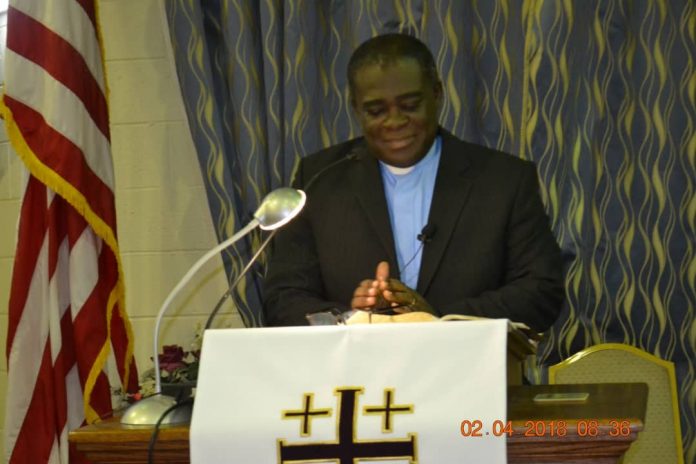|
Getting your Trinity Audio player ready...
|
REV DR KWABENA OPUNI-FRIMPONG
DEPARTMENT OF RELIGIOUS STUDIES,
KNUST KUMASI
WEBSITE: kopunifrimpong.org
INTRODUCTION
The Church’s Discipleship-Making Ministry is a Divine Imperative. Divine imperatives are the non-negotiables of Faiths. They are functions that particular faiths demand and ‘impose’ on the adherents of the faith. In Christianity divine imperatives may include holiness, prayer, offerings, obedience, fasting, evangelism, accountability, discipleship-making etc. Our resurrected Lord instructs the church to,
‘Go therefore and make disciples of all nations, baptizing them in the name of the Father, and of the Son and of the Holy Spirit. Teaching them to observe all things that I have commanded you; and lo, I am with you always, even to the end of the age’ Matt. 28 19-20.
Jesus sends his believers into the World to call Nations to commit themselves to Him as Master and Lord. The instruction to go to the Nations is for all Believers; Lay, Ordained, Young, Old, etc. Specifically, the instruction to go into the Nations is to make disciples. A healthy and vibrant church is determined among others by the quality of its discipleship. When discipleship-making suffers the church’s life and witness subsequently becomes indented. Discipleship-making definitely is to attract the church’s resources, mobilization, capacity building, intercessions etc. as the church seeks to be relevant to society and offer the utmost glory to the Lord of the Harvest as we live in the End Times. Areas that will be considered in this presentation are,
- Discipleship-Making as a call to Relationship and Fellowship.
- Discipleship-Making as a call to Transformation.
- Disciple-Making as a call to a Vocation and Ministry.
- Disciples as People of Power
- The Context/ Environment for Discipleship-Making
Our Lord Jesus calls those who accepts him as his disciples. A disciple of Christ is a person who accepts, believes, is convinced and admires him as Lord. They are dedicated followers of Christ and assist in the spreading of the Christian faith. Jesus invites people from all nations and backgrounds to be his disciples. The foundations of discipleship, according to Mark include relationship, ministry and demonstration of power over sicknesses and demons.
‘And He went up on the mountain and called to Him those He Himself wanted. And they came to Him. Then He appointed twelve, that they might be with Him and that He might send them out to preach , and to have power to heal sicknesses and to cast out demons Mark 3:13-15. (NKJV)
Discipleship-Making as a call to Relationship and Fellowship.
The primary intention of Jesus in selecting disciples is for the purpose of fellowship and relationship. He wants his disciples first and foremost to be with him. There may be many activities and roles for a disciple of Christ to play in the church however, the starting point of Christian discipleship making must always be responding and developing a relationship with the Lord. Paul in his benedictions frequently calls for the grace of the Lord Jesus Christ and his fellowship to be upon the disciples.
‘The grace of the Lord Jesus Christ, and the love of God and the Communion/fellowship of the Holy Spirit be with you all’ 2Cor 13:14. (NKJV)
One of the primary task of disciples and those in the ministry of making disciples is to develop the deep sense of love to be with the Lord. This fellowship with the Lord must be both private and public. Moreover, the relationship must take place at all levels of a person’s development. As it is expected age, economics, education, ethnicity, gender, social status, etc. should not take a disciple away from the fellowship with the Lord.
The fellowship with the Lord must lead to fellowship with other disciples of Christ. A disciple must be enthused to associate with other disciples of Christ. A disciple must not be ashamed to associate with the Lord and other people who have also responded to the invitation to become his disciples. In the admonishing of the Apostle Paul,
‘Let us hold fast the confession of our hope without wavering, for he who promised is faithful. And let us consider one another in order to stir up love and good works, not forsaking the assembling of ourselves together, as is the manner of some, but exhorting one another, and so much the more as you see the Day approaching’ Heb. 10:23-25.
The disciples will receive the blessings of the fellowship with the Lord and also be a blessing in the fellowship only when they make themselves constantly available for the fellowship. Christian discipleship-making, it must be noted, develops its roots, growth, maturity, strength and appropriation in relationship and fellowship. A disciple must not only be enthused about what can be taken out of the fellowship but also what can be brought into the fellowship. Those in the ministry of discipleship-making must always pay attention to the development of the relationship and constant fellowship with the Lord and his church.
The fellowships vertical (the fellowship with the divine) and horizontal (fellowship with the church/members) dimensions of discipleship must be developed and consciously sustained at all times. It’s strange for a person to have relationship with the Lord without fellowship with His church, but it’s suicidal for a person to have relationship with the church without a fellowship with Christ. Such individuals may love the church for varied reasons that eventually will make them live sinful lives in the church. It’s the vertical relationship (relationship with the Lord) that keeps the disciples in the consciousness of the presence of the Lord and the fear of the Lord in their lives at all times.
Discipleship-Making as a call to Transformation.
Disciples must desire not only to be in relationship with the Lord but also to grow in fellowship with the Lord. The strength and quality of a person’s Christian spirituality is actually determined by how close that individual has been with the Lord. As they spend time with the Lord a disciple of Christ is expected to be transformed into the image of the Lord who invites them into relationship. In Roms 12:1-2, Paul instructs the disciples not to conformed to the world but be transformed by the renewing of their minds.
‘I beseech you therefore, brethren, by the mercies of God, that you present your bodies a living sacrifice, holy, acceptable to God, which is your reasonable service. And do not be conformed to this world, but be transformed by the renewing of your mind, that you may prove what is that good and acceptable and perfect will of God.’
The Apostle Paul is himself an embodiment of the transformation that must take place in a disciple. He became a lover of the faith that he once received authority to destroy. In Acts 9 Saul an enemy of ‘the Way’, as the Christians where initially called received authority to destroy the disciples in Damascus. His spiritual encounter with the Lord brought him closer to the disciples to nurture him in the faith. The disciples received Paul a noted enemy of the gospel and,
‘So when he had received food he was strengthened. Then Saul spent some days with the disciples at Damascus.’ Acts 9:19.
It was during his stay with the disciples that his transformed life as a disciple became manifested. In fact, those who witnessed his early life as a disciple became amazed and doubtful.
‘Immediately he preached the Christ in the synagogue that He is the Son of God. Then all who heard were amazed, and said, “Is this not he who destroyed those who called on this name in Jerusalem, and has come here for that purpose, so that he might bring them bound to the chief priest? But Saul increased all the more in strength, and confounded the Jews who dwell in Damascus, proving that this Jesus is the Christ Acts 9: 20- 22”
Disciple-makers must themselves remain disciples of Christ and demonstrate transformed lives. The opposite of this especially, among Christian leaders presents frustrated mentorship, hypocrisy and weak discipleship-making ministry in the church. The transformed life of the disciples is an indication that they are not just followers but also obedient learners and servants.
Devotion to the Spiritual Disciplines
Disciples are transformed through the Christian Spiritual Disciplines. The Spiritual disciplines are the core Christian activities that provide the spiritual oxygen for the spiritual pilgrimage of the disciple. They include study, simplicity, contentment, submission, fasting, meditation, prayer, fellowship, service, worship, silence, etc.
‘And they continued steadfastly in the apostles’ doctrine and fellowship, in the breaking of bread, and in prayers.’ Acts 2:42
Such spiritual disciplines are pathways to spiritual growth and discipleship-making. A disciple must be committed to such spiritual activities that help them stay spiritually connected and conscious. Activities like regular prayer, fasting, meditation, study, simplicity, submission, worship and service must be deliberately developed by a disciple of Christ. Discipleship making becomes defective if other things apart from the spiritual disciplines influence and dominate members of the church. Christians who subject themselves into regular exercise and discipline of such spiritual activities develop both their inner and outward identities according to the outcomes of the spiritual activities.
Church members must love their Pastors but if love and loyalty of Pastors get hold of church members they cannot be properly rooted in Christ. Moreover, demonstration of spiritual gifts is very helpful for Christian formation. However, when manifestations of spiritual gifts, demonstration of power and miracles dominate discipleship-making the church will be in spiritual defectiveness. It is more dangerous when spiritual materials like anointed oil, water, soap, handkerchief etc. sustain the spiritual journey of a disciple of Christ. The spiritual disciplines must be the drive for discipleship-making. The role of Pastors must remain facilitation and midwifery.
Disciple-Making as a call to a Vocation and Ministry.
Among the disciples, Jesus assigns men and women into ministries and various services. In Acts of the Apostles, the Holy Spirit through prophetic utterance instructed that Barnabas and Saul be separated for the task assigned to them.
‘Now in the church that was at Antioch there were certain prophets and teachers: Barnabas, Simeon who was called Niger, Lucius of Cyrene, Manaen who had been brought up with Herod the tetrarch, and Saul. As they ministered to the Lord the Holy Spirit said ‘Now separate to Me Barnabas and Saul for the work to which I have called them. Then having fasted and prayed, and laid hands on them, they sent them away’. Acts 13:1-3
Saul as part of the process of being a disciple is called into a vocation and ministry. His ministry sent him to many cities of the then known world proclaiming the Lordship of Christ and teaching the churches on how to live their lives in the Lord. A remarkable example is his role in mentoring and discipling his son in the faith Timothy. Apart from his role in making Timothy a disciple he also gave him the charge to make other people disciples of Christ. Paul instructed Timothy that,
‘what you have heard from me in the presence of many witnesses entrust to faithful men, who will be able to teach others also’ 2 Timothy 2:2.
A disciple is to assist in the coming in and mentoring of others into the image of Christ. Discipleship-making involves personal attention and guidance from one maturing Christian to another ‘younger’ believer in the faith. It’s essentially spiritual parenting; intentionally and relationally investing oneself in the spiritual growth and maturity of some disciples – part of which is training those disciples who also in turn will disciple others.
Christian Ministries
The church at any time must have disciples to fulfill the various ministries including Prophetic, Healing and deliverance, preaching, teaching, service, worship administration, counseling, evangelism, advocacy etc.
Disciples as People of Power
The instruction to the disciples to go and make disciples comes within the context of power. Jesus came and announced to them that all power has been given to me therefore go. The disciples may be weak, empty, frighten etc. the motivation to go was not within themselves but in the resurrected Lord. They are to go into the nations not because they have all but because the one sending them does. In deed they are people of power. The Holy Spirit is present to give the divine enablement and direction. Prison doors were opened for the early disciples while they could also bring divine favor on those who had needs and put their trust in the Lord for help. Indeed, the Church and her disciples are people of power and therefore must function as such. Jesus wants the disciples to possess and demonstrate power over sicknesses and demons.
The Context/Environment of Discipleship –Making
Discipleship-making takes place in some specific contexts/environments. The discipleship making contexts are the cathedral church and the church outside the cathedral. The cathedral church discipleship-making are the specific activities that take place in particular churches/congregations with the primary intention of discipleship making and Christian formation. Among them are the Bible studies, preaching, various ministries, workshops, conferences, etc.
It must however be noted that the church outside the cathedral also contribute towards discipleship making. The challenge however is that some of such activities of the church outside the cathedral can end up undermining healthy Christian discipleship making efforts. The para-church groups like Scripture, Women Aglow etc. facilitate discipleship making. Contemporary media is equally influencing discipleship making through TV and Radio preaching, all night prayer meetings on TV/Radio, distribution of devotional materials, market place preaching, sermon in busses etc. Christian information on social medial platforms e.g. Facebook, WhatsApp Twitter, Instagram, online outreaches like Livestreaming, websites, videos, etc.
Discipleship making ministers must consider both the cathedral church and the church outside the cathedral for the discipleship making efforts.
Building The Enabling Context/Environment for Effective Discipleship
Goodwill and Public Respect
The early church had respect within the society. The goodwill of the church sustained the credibility of the church that once was under public attack. Acts 2:47. The public impression of a church is very key in discipleship making as they provide inner trust and confidence to church members that they have identified themselves with right and proper organization/family/church.
A caring church
The Acts of the Apostles’ church was a caring church. The needs of the people were addressed as a core mandate of the church. The disciples had the inner assurance that they were living in a caring family and that their challenges would attract the attention of others Acts 2:44-45. Among others the organizers of evening week long revival meetings for example must consider arranging free busses services to assist members who participate in such meetings to arrive at their destinations or at least get them closer to locations where they can access transport without much difficulty after the service.
Sound Systems and Structures
The management and administration was not left to chance. Sound systems and proper structures were built for the growth of the church and other related matters. Spirit filled men were put together in committees to be responsible for the distribution of food to the family, Acts 6:1-7. When there was an attacks on Saul’s life to destroy him the other disciples worked towards his safety and escape from danger.
‘Now after many days were past, the Jews plotted to kill him. But their plot became known to Saul. And they watched the gates day and night, to kill him. Then the disciples took him by night and let him down through the wall in a large basket.’ Acts 9:23
Mobilizing Contemporary Media Resources for Church Growth
Apostolic writings and pastoral letters were major resources for Christian nurturing and discipleship making. They made use of the then available media resources for effective Christian ministry and nurturing.
Discipleship-making and Christian formation in the New Testament moments survived through the writing and reading of apostolic writings. Christian information and instructions were sent to the faithful in writing. The leadership of the churches were required to read the letters to the hearing of all the believers (1Thess 5: 25-28). Commentaries and interpretations on theological subjects were written and circulated among the believers. Paul instructed for example the church in Thessalonians that after they have read a letter he has sent to them, they must ensure that they send it to the believers in Laodicea Col 4: 16. Contemporary media cultures like the oral, print, audio/visual, internet facilities, social media, live streaming etc. provide the church with resources that ought to be explored for discipleship-making and effective Christian ministry.
Ministry to the Margins
Discipleship-making must accommodate all God’s people especially people with some physical challenges and differently abled like prisoners, the blind, dumb, deaf etc. While in prison, Paul and Silas took advantage of the breaking of their chains to minister to the Jailer and the prison inmates Acts 16:16-40. Discipleship- making must pay special attention to the people in the margins.
Spirit of Intercession
Discipleship-making in the Acts of the Apostles church took place in the environment of prayer of intercessions. ‘Peter was therefore kept in prison, but constant prayer was offered to God for him by the church’. Acts 12:5
Transforming Discipleship
The Christian God does new things among those who he calls into fellowship. Discipleship as a Christian spiritual exercise is expected also to experience transformation especially in situations that the routines in the church seems not producing the expected Christian maturity and impact.
A discipline and Orderly Church
Neglect of the reading and observance of the pastoral letters attracted sanctions. In 2 Thes 3: 14, Paul instructed ‘and if anyone does not obey our word in this epistle, note that person and do not keep company with him, that he may be ashamed’.
Equipping the Lay Ministry
Discipleship-making is a responsibility of both the Ordained and Lay ministries of the church. The ordained are expected to equip the lay as partners for effective ministry. The lay and ordained are not in competition. They are partners in ministry for the bigger glory of the Lord of the harvest.
REV DR KWABENA OPUNI-FRIMPONG
DEPARTMENT OF RELGIOUS STUDIES
KNUST-KUMASI
Email: opuni@hotmail.com / opuni24@yahoo.com
Phone: 024-480-1324 / 050- 480-1324
Website: kopunifrimpong.org














